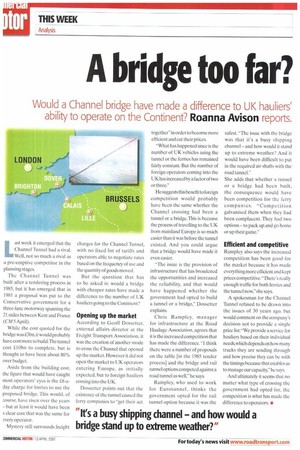A bridge too far?
Page 20

If you've noticed an error in this article please click here to report it so we can fix it.
Would a Channel bridge have made a difference to UK hauliers' ability to operate on the Continent? Roanna Avison reports.
Last week it emerged that the Channel Tunnel had a rival. Well, not so much a rival as a pre-emptive competitor in the planning stages.
The Channel Tunnel was built after a tendering process in 1985, but it has emerged that in 1981 a proposal was put to the Conservative government for a three-lane motorway spanning the 21 miles between Kent and France (CM5 April).
While the cost quoted for the bridge was f3bn, it would probably have cost more to build.'The tunnel cost i lOhn to complete, but is thought to have been about 80% over budget.
Aside from the building cost, the figure that would have caught most operators' eyes is the a-aday charge for lorries to use the proposed bridge. This would, of ::.ourse, have risen over the years but at least it would have been 1 clear cost that was the same for 2,very operator.
Mystery still surrounds freight charges for the Channel Tunnel, with no fixed list of tariffs and operators able to negotiate rates based on the frequency of use and the quantity of goods moved.
But the question that has to be asked is: would a bridge with cheaper rates have made a difference to the number of UK hauliers going to the Continent?
Opening up the market
According to Geoff Dossetter. external affairs director at the Freight Transport Association, it was the creation of another mode to cross the Channel that opened up the market. However it did not open the market to UK operators entering Europe, as initially expected, hut to foreign hauliers coming into the UK.
Dossetter points out that the existence of the tunnel caused the ferry companies to "get their act together" in order to become more efficient and cut their prices.
"What has happened since is the number of UK vehicles using the tunnel or the ferries has remained fairly constant. But the number of foreign operators coming into the UK has increased by a factor of two or three."
He suggests this benefit to foreign competition would probably have been the same whether the Channel crossing had been a tunnel or a bridge. This is because the process of travelling to the UK from mainland Europe is so much easier than it was before the tunnel existed. And you could argue that a bridge would have made it even easier.
"The issue is the provision of infrastructure that has broadened the opportunities and increased the reliability, and that would have happened whether the government had opted to build a tunnel or a bridge," Dossetter explains.
Chris Rampley, manager for infrastructure at the Road Haulage Association, agrees that it is the increased competition that has made the difference. "I think there were a number of proposals on the table [in the 1985 tender process] and the bridge and rail tunnel options competed against a road tunnel as well," he says.
Rampley, who used to work for Eurotunnel, thinks the government opted for the rail tunnel option because it was the safest. "The issue with the bridge was that it's a busy shipping channel and how would it stand up to extreme weather? And it would have been difficult to put in the required air shafts with the road tunnel."
She adds that whether a tunnel or a bridge had been built, the consequence would have been competition for the ferry companies. "Competition galvanised them when they had been complacent. They had two options to pack up and go home or up their game."
Efficient and competitive
Rampley also says the increased competition has been good for the market because it has made everything more efficient and kept prices competitive. "There's really enough traffic for both ferries and the tunnel now," she says.
A spokesman for the Channel Tunnel refused to be drawn into the issues of 30 years ago. but would comment on the company's decision not to provide a single price list: "We provide a service for hauliers based on their individual needs,which depends on how many trucks they are sending through and how precise they can be with the timings because that enables us to manage our capacity," he says.
And ultimately it seems that no matter what type of crossing the government had opted for, the competition is what has made the difference to operators. •


















































































































































































